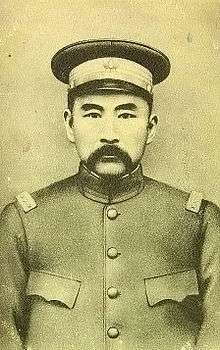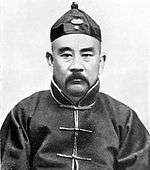Zhang Xun
Zhang Xun (simplified Chinese: 张勋; traditional Chinese: 張勳; pinyin: Zhāng Xūn or; Wade–Giles: Chang Hsün; September 16, 1854 – September 11, 1923), courtesy name Shaoxuan, was a Qing loyalist general who attempted to restore the abdicated emperor Puyi in the Manchu Restoration of 1917. He also supported Yuan Shikai during his time as president.[3]
Zhang Xun 張勳 | |
|---|---|
 | |
| 3rd Prime Minister of the Imperial Cabinet | |
| In office 1 July 1917 – 12 July 1917 | |
| Monarch | Xuantong Emperor |
| Personal details | |
| Born | 16 September 1854 Fengxin County, Yichun, Jiangxi, |
| Died | 11 September 1923 (aged 68) Tianjin, Zhili, |
| Political party | Royalist Party[lower-alpha 1] |
| Military service | |
| Nickname(s) | Queue General |
| Allegiance | |
| Branch/service | |
| Years of service | 1884–1917 |
| Rank | General officer |
| Battles/wars | Boxer Rebellion Xinhai Revolution Second Revolution National Protection War Manchu Restoration |
Biography
He was born on September 16, 1854.[3]
Zhang served as a military escort for Empress Dowager Cixi during the Boxer Uprising. He later served as a subordinate of General Yuan Shikai in the Beiyang Army. He fought for the Qing at Nanjing in 1911, and then after the fall of the Qing, he remained loyal to Yuan Shikai. Despite serving as a general in the new Republic, he refused to cut his queue, as a symbol of his loyalty to the Qing. He was called the "Queue General". He seized Nanjing from the KMT in 1913, defeating the Second Revolution. Despite allowing his troops to savagely loot the city, Zhang was named a field marshal by Yuan.[3]

Between 1 July 1917 and 12 July 1917, Zhang Xun proclaimed himself Prime Minister of the Imperial Cabinet by entering Beijing to reinstate the deposed Puyi as Emperor of the Qing dynasty. However, Zhang Xun's proclamation in July 1917 was never recognized by the Government of the Chinese Republic, most of the Chinese people, or any foreign countries. Other generals loyal to the Republic subsequently thwarted Zhang and forced Puyi to abdicate again. Zhang then took refuge in the Dutch legation and never participated in politics again.[3]
He died on September 11, 1923.[3]
Notes
References
- Chi (1970), p. 127.
- Billingsley (1988), p. 57.
- Aisin-Gioro, Pu Yi (1964,1987, 2002). 我的前半生 [The First Half of My Life; From Emperor to Citizen: The Autobiography of Aisin-Gioro Pu Yi]. Foreign Languages Press. ISBN 978-7-119-00772-4.
- Billingsley, Phil (1988). Bandits in Republican China. Stanford, California: Stanford University Press.CS1 maint: ref=harv (link)
- Chi, Madeleine (1970). China Diplomacy, 1914-1918. Cambridge, Massachusetts: Harvard University Press.CS1 maint: ref=harv (link)
| Political offices | ||
|---|---|---|
| Preceded by Yuan Shikai (1912) |
Prime Minister of the Imperial Cabinet 1 July 1917 – 12 July 1917 |
Succeeded by Position abolished |